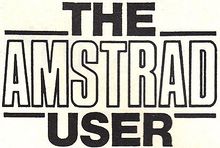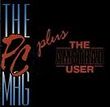The Amstrad User (TAU) was published in Australia by Strategy Publications in Mount Waverley, Victoria (not to be confused with Strategy Software in Tasmania that produced Computing With The Amstrad - Australian Edition), with the first issue coming out in February 1985 (@ $3.00 per issue).
To start with, it soley covered the Amstrad CPC 464, then the CPC 664 & CPC 6128. As other Amstrad computers were released the magazine covered them all. At its peak, the range the magazine covered was: CPC, PCW8256, PCW8512, PCW9512, PC1512, PC1640, PPC512, PPC640, PC2086, PC2286, PC2386, PC20, PC1286, PC1386, ALT286, ALT386SX, PC3086, PC3286 and PC386SX.
It was an independent publication, originally sourcing and writing all it's own articles and content from writers mostly within Australia.
As this became more difficult with time, it set up agreements with Future Publishing and Database Publications to reprint content from their respective magazines - Amstrad Action, 8000 Plus and CPC Computing (formerly Computing with the Amstrad).
It had a fairly conventional layout and design and each issue included things like games reviews, type-ins, game cheats, an adventure section, hardware and letters to the editor. It generally separated CPC only content from PCW and PC content - however sometimes articles were published that were generally applicable to all of the Amstrad machines.
The magazine was also available on tape for Amstrad CPC users, and it included any type-ins that were in that issue plus bonus material.
This was on a subscriber only basis and the tape was never directly sold with the magazine.
The magazine was widely available throughout Australia and New Zealand from 1985 through to the end of 1990. It was also available to the general oceania region - nearby countries such as New Caledonia, Brunei, French Polynesia, Indonesia, Kiribati, Malaysia, Nauru, Niue, Samoa, Singapore, Tonga, Tokelau, Fiji, Papua New Guinea, Vanuatu and the Solomon Islands - although on a more limited and not as timely basis.
It was a reasonable sized magazine. Early issues being around 32 pages, with the magazine peaking at 72 pages. Most issues were 64 pages including the 1991 name change.
1991 - Name Change
After issue 71 (Dec 1990), it became known as "The PC Mag plus The Amstrad User" (Jan 1991 was the first issue @ $4.50 per issue) - issues were no longer numbered. It still contained Amstrad CPC/PCW/PC content and was obviously trying to appeal to the broader PC clone market (IBM Compatible owners) - rather than specifically just the Amstrad. This was a hard decision the Editor said (In Issue_71_(_Dec._90_)) - Amstrad Australia in Sydney had dropped the CPC range (along with the PCW8512) by 1989 and was refusing to import them even though the parent company in the UK was still releasing models. They decided instead to concentrate on the PC compatibles. This was reflected by the change in the message seen at the top of the magazine - it started out as "The magazine for PC Beginners" and eventually changed into "For Amstrad, IBM and other PC Compatibles beginners" - although, there was content that was not necessarily only for beginners.
It ran until September 1991 (9 issues in total) with Strategy Publications ceasing to produce the magazine around then due to obviously declining magazine sales and popularity of Amstrad machines. It is unknown if Strategy Publications completely ceased operations, changed their name or merged with another publisher.
Note on the scans: Only the relevant CPC sections of these magazines has been scanned and uploaded (to cut down on the manual labour). So all advertising, PCW & PC content is not included (unless some CPC content spills over).
Magazine Scans (W.I.P)
- The Amstrad User
- The PC Mag plus The Amstrad User
- The Amstrad User - other publications
The team at The Amstrad User released a collection of type-ins and programs in the late 80's called High Energy Programs for the Amstrad. It contained programs that had appeared in previous magazines and also new material.
















































































